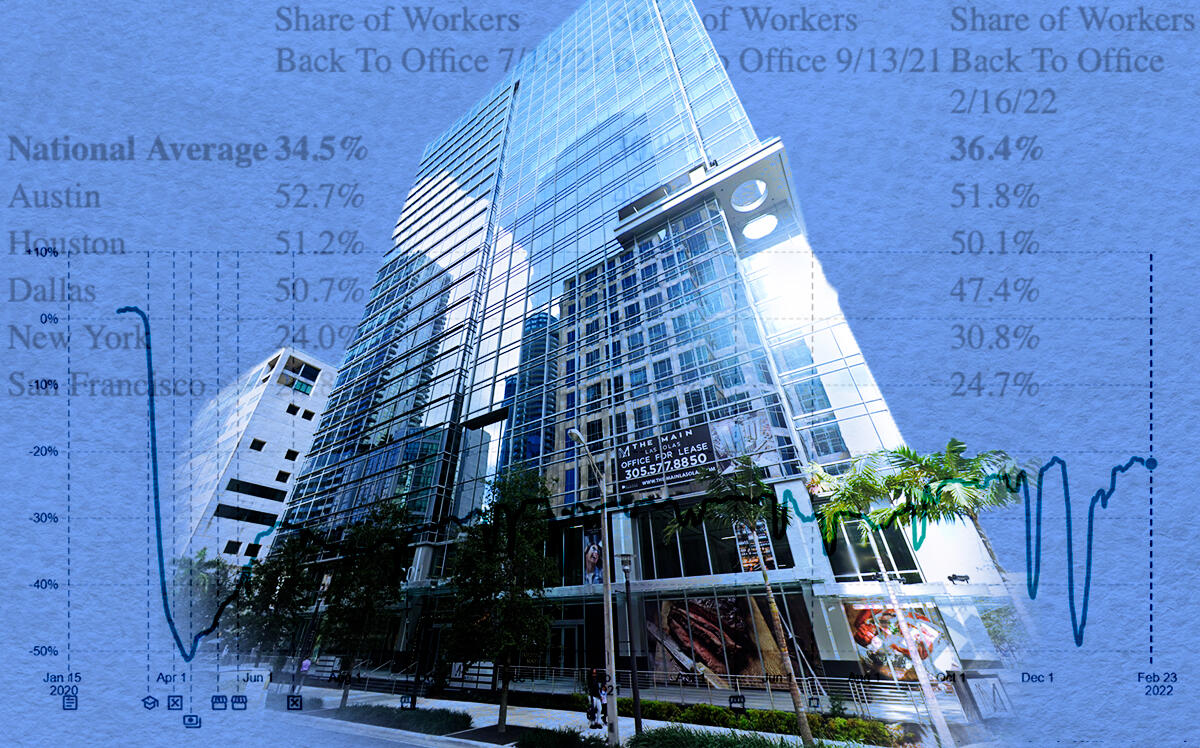Downtown Fort Lauderdale’s return to the office is outpacing that of major markets such as New York, San Francisco and Austin, as well as the national average, a new report shows.
From 50 percent to 55 percent of workers were back to working in the office in February in downtown Fort Lauderdale, a 10 percentage point increase compared with summer 2021, according to the report from the Fort Lauderdale Downtown Development Authority.
“I think what we are seeing is employees are eager to break the routine from the past two years from the pandemic,” said Matthew Schnur, research and innovation manager at the DDA.
The strong return to the office is partly rooted in the population influx to downtown, a “critical mass” that has fueled more retail and restaurant openings, he said. Dining and shopping options are vital to creating a vibrant downtown to draw workers, and office amenities such as gyms and rooftop bars are pivotal in prompting a return of employees, Schnur said.
The DDA study is based on estimates provided by office property managers and traffic in the garages, and compares to findings by nationwide Class A office building security provider Kastle Systems, whose “Back to Work Barometer” tracks occupancy in 10 U.S. metro areas.
Kastle Systems, which uses card swipe data for its estimates, does not track the Miami-Fort Lauderdale metro area. But it shows that almost 31 percent of New York workers were back to the office as of February, almost 25 percent in San Francisco, 50 percent in Houston and almost 52 percent in Austin. The national average of return to the office was 36.4 percent, according to Kastle Systems.
The DDA study focused exclusively on Class A office buildings from East Broward Boulevard south to the New River, and from South Federal Highway east roughly to Andrews Avenue, Schnur said.
Included in this area is the 25-story office tower that is part of The Main Las Olas, completed in 2020. It is part of the larger, 1.4 million-square-foot mixed-use development that spans a full city block and includes the Novo Las Olas apartment tower and retail. A partnership of Stiles and Shorenstein Properties developed the complex.
The Main office tower is 93 percent leased, with tenants including Synovus bank, which took 19,985 square feet, and audit and tax consulting firm RSM, which took 16,570 square feet, according to a news release.
Danet Linares of Blanca Commercial Real Estate is the leasing agent for the office building’s landlord.
The amenities at the tower, at 201 East Las Olas Boulevard, such as the gym, conference center and tenant lounge are playing a role in tenant demand, said Christina Stine Jolley, also of Blanca Commercial.
The tech company influx to South Florida largely has concentrated on Miami’s Wynwood, although the demand from these companies could start creeping north to downtown Fort Lauderdale.
“Historically the downtown Fort Lauderdale office market has been driven by financial and legal service firms,” Stine Jolley said. “We have seen an influx of new-to-market firms in the last year or so, and that has included some tech [firms] and it also has included some real estate, legal, financial services, insurance” companies.
The direct vacancy rate across downtown Fort Lauderdale decreased to 18.7 percent in the fourth quarter of 2021, down by roughly 5 percent from the third quarter, said Stine Jolley, citing Blanca Commercial data.
“I think it speaks to the continued urbanization of downtown Fort Lauderdale. Just since the pandemic alone, we have seen over 275-plus residential move-ins every month,” she said. “People, they want to live and work here.… It’s something we are projecting is only going to increase and have greater velocity, frankly, over the next few years. “
